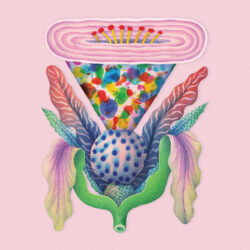
Gentle upbeat reflection of life’s ups and downs from returning singer-songwriter.
 A ‘Fool’s Spring’ is essentially a quixotic false dawn. We are lulled into believing that the worst of winter is done for another year, discarding our protective outer layers only to be undone by the return of winter’s fierce, dark cold times. It happens regularly, yet we still get suckered into the premature hope each time. ‘Fool’s Spring’ is also the title of Luke Sital-Singh’s latest and first self-produced album. The album title references this turbulence – “the poetry of thinking a dark time is over, only for it to return… resonates with the theme of the album” as he sees it.
A ‘Fool’s Spring’ is essentially a quixotic false dawn. We are lulled into believing that the worst of winter is done for another year, discarding our protective outer layers only to be undone by the return of winter’s fierce, dark cold times. It happens regularly, yet we still get suckered into the premature hope each time. ‘Fool’s Spring’ is also the title of Luke Sital-Singh’s latest and first self-produced album. The album title references this turbulence – “the poetry of thinking a dark time is over, only for it to return… resonates with the theme of the album” as he sees it.
The album takes us on a journey through Sital-Singh’s difficult recent family history. He clarifies that it was created “… in the hardest season of my life, as my wife and I struggled to begin a family” the parenting challenges were not the only issues imposing themselves on the songwriter’s craft though. There were also the highs and lows of their time living in LA – an idyllic outdoor life in the sun as part of a creative community milieu offset by visa induced isolation from family and friends along with the ruinous cost of US healthcare.
‘Fool’s Spring’ stems from these experiences, the couple’s eventual return to the UK and the birth of their first child. It is concerned with the emotional fluctuations wrought by these life shifts and with the simple vicissitudes of trying to live a life well. Fortunately, both lyrically and sonically, ‘Fool’s Spring’ is impressionistic rather than narrative in nature. Sital-Singh notes that whilst these songs don’t directly address their discomfort it did shape his writing; “casting its shadow over every note, shaping the songs in ways I’m only just beginning to see”. This less specific approach is perhaps a good thing as great records that interrogate the details of the emotional and physical tribulations of trying to start a family are extremely thin on the ground.
Whilst it is not intrinsically different to his earlier records, ‘Fool’s Spring’ does paint from a broader palette than he’s previously used. It’s a stretch to call the record eclectic; it is still, at heart, a gentle, folk-tinged singer-songwriter album, but there is plenty of elusive exploratory production on the album. These touches self-effacingly create interest without flashily demanding the listener’s attention at the expense of the song. So throughout, there are snatches of pedal steel, double-tracked vocals that bring a Fleet Foxes vibe, brief electronic stabs and interesting percussive interjections. This was all part of Sital-Singh’s stated aim to broaden his oeuvre beyond a simple singer-songwriter outlook. In particular with ‘Fool’s Spring’ he wanted to create a “more upbeat” album, yet one that still has “a lot of depth to it”. Whilst the record does not immediately offer itself up as a buoyant sonic celebration, its ultimate mood is one of sanguine if stoic optimism with a healthy dose of warm hearted longing.
That he was able to deliver on this vision for the record is due in large part to its singular creation process. Sital-Singh was individually and directly responsible for a majority of its construction, playing most of the instruments, producing and engineering as well as writing and singing. There were also nostalgic nods to the circumstances of some of his other recording experiences at play too. All this offers up a record that is a singular representation of Sital-Singh as an artist and a human being, he aches through every sound and word of ‘Fool’s Spring’. The satisfaction he derived from this level of creative control over the process is evident throughout and in the relaxed tone overall. Occasionally its sonic lightness of touch, its gentleness, can see it drift out of focus and we have to remind ourselves to pay attention, but this is a small price to pay for the warmth and humanity we get from attentive listening.
It also mean that the record sounds like nobody other than Luke Sital-Singh and does not fit neatly in any kind of genre box. Sure there are touches of Dawes scampering LA freeway chug (‘Hold the Lightning’), Midlake’s restrained introspection (‘In Your Eyes’), the sparse indie-tronica of Postal Service (‘True Love’) or the atmospheric, canyon fed yearning of Bonny Light Horseman (‘Little River’). Ultimately though ‘Fool’s Spring’ is fundamentally his own record. One that reflects his upbeat optimism and hope of the future like a warm and welcome embrace from a good friend.


